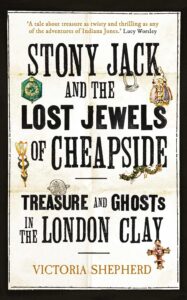
Stony Jack and the Lost Jewels of Cheapside: Treasure and Ghosts in the London Clay
by Victoria Shepherd
Genres: History, Non-fictionPages: 400
Rating:

Synopsis:June 1912. A pair of workmen deposit a heavy ball of clay in the antiques shop of George Fabian Lawrence, or ‘Stony Jack’ as he's better known. As Lawrence picks through the mud, a speck of gold catches his eye. A pearl earring tumbles into his hand, then another. A Burmese ruby follows; then Colombian emeralds, lapis lazuli from Afghanistan and turquoise from Iran; tankards; watches; topaz; amazonite.
Stony Jack has discovered the greatest single cache of Elizabethan treasure.
Diving into London’s bustling, sometimes lawless, antiques trade at the turn of the century, Victoria Shepherd provides a compelling portrait of the city at the height of empire. A thrilling ride through Edwardian London, from the marble halls of the British Museum to the East End's maze of tenements and alleyways, Stony Jack and the Lost Jewels of Cheapside oversees the transformation of the city into a modern metropolis.
Victoria Shepherd’s Stony Jack and the Lost Jewels of Cheapside digs into the story of the Cheapside Hoard, a cache of jewellery and gems from the 16th-17th century found during building work in 1912. “Stony Jack” was the navvies’ name for G.F. Lawrence, an antiquarian-cum-pawnshop owner who did work for various museums and spent most of his life hanging around construction sites hoping to swoop on interesting finds (including but not limited to jewellery). Shepherd traces the fate of the hoard, tries to figure out to whom it belonged, and discusses the lives of various people who were involved with it in some way.
There are a few problems with it, fascinating as I find that. The first is that Shepherd never met a digression or a wild supposition that she didn’t love. Everything is “maybe Queen Mary was in a car accident somewhere near Stony Jack’s shop because she wanted to go look at it”. And maybe not?! This isn’t fact, unless there’s some shred of evidence other than geographical closeness. There’s loads about Howard Carter, who had nothing to do with the hoard itself, beyond knowing Lawrence. And yet for all that, she chooses not to dig into the sordid details of the paedophilia that one of the major players was involved in, explicitly eliding it to focus on her narrative, and allowing you to forget the man was total scum who abused children.
She also commits astonishing errors of fact in at least one field I know something about, Egyptology. Here’s one of her (very characteristic) run-on sentences, which contains so many errors it’s difficult to know where to start:
Now the world would know about the later kings of Egypt of the Eighteenth Dynasty, and Tutankhamun specifically, who, with his father, had reverted to the worship of one deity, Amun, the sun god, ending Egypt’s long-standing polytheism.
Akhenaten, who was probably (but not certainly) Tutankhamun’s father, worshipped the Aten, very much not Amun. The clue is in his name. Although his court at Amarna converted to monotheism, some no doubt more for political reasons than religious, the rest of Egypt didn’t instantly drop polytheism. This was not a “reversion”, either: Egypt hadn’t been monotheistic previously. You can’t revert to something you’ve never been.
Tutankhamun then later reverted to the worship of Amun, against his father rather than with him, and Amarna was abandoned. Polytheism in Egypt didn’t end: at best, it took a very, very short pause. Tutankhamun probably worshipped the Aten with his family when he was young, but he definitely didn’t “revert to the worship of one deity” with his father.
I unpack all that to give you the idea of how wildly bad Shepherd’s very basic scholarship is, so that you can take the book with appropriate heapings of salt on everything else. It’s just wrong in so many ways. And sure, maybe she’s better on her own ground, but the facts of the Amarna Period in Egypt are so easy to discover that her ability to do basic fact checking seems suspect.
It’s a mildly entertaining read, but I fear that vast chunks of it are absolute fiction, even if it’s plausible fiction, and Shepherd’s scholarship is untrustworthy based on the aspects of it I can fact-check. It gets two stars because I did find it interesting enough to finish, but I can’t in good conscience give it more when it’s so very, very bad.

Leave a Reply